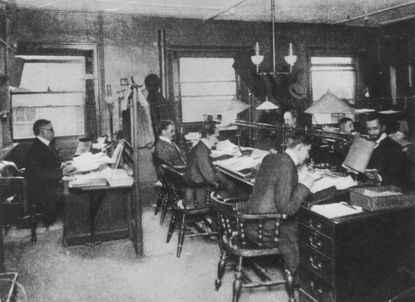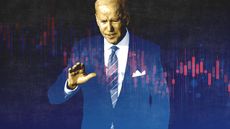Unbiased reporting is a historical anomaly
The journalistic ideals of objectivity and accuracy are dying. That means we're returning to the American norm.


The ideals of journalistic objectivity and accuracy are taking a beating. On that nearly everyone on every side of the media wars can agree.
On the right, we find the increasing embrace of an explicitly partisan slant to the news. This is the case from Breitbart and its many muckraking imitators on the far right to Fox News, which has come to define itself as the mouthpiece of the Trump administration, just as it did for the administration of George W. Bush.
On the other side of the aisle, from lefty Truthout and HuffPost to the more centrist New York Times, we've seen a sharp increase in sloppiness as well as unprecedented displays of outright partisanship, driven as much by hostility to and provocation from President Trump and the Republican Party as it is by economic pressure to generate the online traffic that promises to increase ad revenue.
Subscribe to The Week
Escape your echo chamber. Get the facts behind the news, plus analysis from multiple perspectives.

Sign up for The Week's Free Newsletters
From our morning news briefing to a weekly Good News Newsletter, get the best of The Week delivered directly to your inbox.
From our morning news briefing to a weekly Good News Newsletter, get the best of The Week delivered directly to your inbox.
The collapse in standards of dispassionate and carefully measured reporting is a big problem — but is it something unprecedented? The truth is that it isn't. And reaching a sober assessment of the situation requires that we take account of this fact.
The standards of fairness and accuracy that we associate with journalism are not the American norm. They became the norm in the decades following the end of the Second World War, as the bipartisan centrist-liberal consensus that prevailed in political culture left its mark on the media. This was also a time of unprecedented uniformity in the institutions that delivered the news to the American people. Three television networks, a pair of weekly newsmagazines, and a handful of print newspapers set the tone, policed standards, and served as gatekeepers in the dissemination of information consumed by much of the country.
That's not the way it worked throughout American history up until then. As political science graduate student Steven Webster recently documented in a series of tweets, newspapers at the time of the country's founding were explicitly tied to different parties and factions — and regularly used blistering language to denounce those on other sides of political disputes. They also published rumors and conspiracy theories alongside factual accounts of events, often mixing the one in with the other.
This informal and blatantly slanted style of reportage continued on down through the 19th century. In the words of historian Christopher Childers:
[At the time of the Civil War] the partisan press often acted as a part of the campaign apparatus, a facet of politics that most Americans accepted as standard practice. Candidates used partisan newspapers to promote themselves and their platform without worrying about anything resembling the objective journalism that modern political observers claim we have lost. From the vantage point of the 19th century, the non-partisan media seems the anomaly. [The Journal of the Civil War Era]
It was an anomaly — and an extremely salutary one. Just as the United States became a global hegemon at the close of World War II, the American press became professionalized and set itself the goal of serving as an arbiter of extra-partisan truth.
Did it fail? Of course it did: not always, but plenty of times. The new standards were ideals — goals to strive for while often falling short. But they also did lots of good, imposing rigor on reporting and giving journalists formal and informal guidelines about how to report in a trustworthy and fair-minded way about the world. As a result, millions of Americans acquired a rudimentary understanding of the country and the world that, while superficial and biased in favor of the Cold War liberal consensus, enabled voters to come to responsible public judgments and make conscientious civic decisions.
Many reporters, editors, publishers, and broadcast news producers still work very hard to realize these ideals today — reporting aggressively but also with great care, double- and triple-checking sources and facts, reflecting thoughtfully on the competing demands of the public's right to know and the need for government secrecy. But growing numbers of media companies and personalities are also willing to cut corners or abandon these norms entirely in the pursuit of influence and profit. The result is a reversion to the flagrantly partisan norms that prevailed before the mid-20th century.
What are the likely consequences? We can't be sure, but it's hard to imagine them being good. The centrifugal forces driving political polarization contribute to the breakdown of trans-partisan journalistic norms, which in turn makes the polarization worse. The feedback loop then breeds cynicism and contributes to the collapse of social trust and the erosion of the authority of all institutions that claim to speak for and act in the name of the common good. Before long, it can begin to seem that it's impossible to evaluate the world dispassionately — that claims to objectivity itself are just masks concealing insidious power-grabs.
This may sound like a headlong leap into postmodern relativism, but it's really a plunge back into the rancorous squabbles and sometimes insurrectionary clashes of an earlier era in American history — before the country achieved its power and influence on the world stage or attained its still-formidable economic might.
Can the country maintain its power and prestige with a citizenry that treats every item of news about the world with maximal suspicion, and when public debate about matters large and small invariably takes the form of acrimonious partisan vituperation?
We don't yet know the answer. But in the coming years we're likely to find out.
Create an account with the same email registered to your subscription to unlock access.
Sign up for Today's Best Articles in your inbox
A free daily email with the biggest news stories of the day – and the best features from TheWeek.com
Damon Linker is a senior correspondent at TheWeek.com. He is also a former contributing editor at The New Republic and the author of The Theocons and The Religious Test.
-
 'Make legal immigration a more plausible option'
'Make legal immigration a more plausible option'Instant Opinion Opinion, comment and editorials of the day
By Harold Maass, The Week US Published
-
 LA-to-Las Vegas high-speed rail line breaks ground
LA-to-Las Vegas high-speed rail line breaks groundSpeed Read The railway will be ready as soon as 2028
By Peter Weber, The Week US Published
-
 Israel's military intelligence chief resigns
Israel's military intelligence chief resignsSpeed Read Maj. Gen. Aharon Haliva is the first leader to quit for failing to prevent the Hamas attack in October
By Justin Klawans, The Week US Published
-
 The pros and cons of noncompete agreements
The pros and cons of noncompete agreementsThe Explainer The FTC wants to ban companies from binding their employees with noncompete agreements. Who would this benefit, and who would it hurt?
By Peter Weber Published
-
 What experts are saying about the economy's surprise contraction
What experts are saying about the economy's surprise contractionThe Explainer The sharpest opinions on the debate from around the web
By Brendan Morrow Published
-
 The death of cities was greatly exaggerated
The death of cities was greatly exaggeratedThe Explainer Why the pandemic predictions about urban flight were wrong
By David Faris Published
-
 The housing crisis is here
The housing crisis is hereThe Explainer As the pandemic takes its toll, renters face eviction even as buyers are bidding higher
By The Week Staff Published
-
 How to be an ally to marginalized coworkers
How to be an ally to marginalized coworkersThe Explainer Show up for your colleagues by showing that you see them and their struggles
By Tonya Russell Published
-
 What the stock market knows
What the stock market knowsThe Explainer Publicly traded companies are going to wallop small businesses
By Noah Millman Published
-
 Can the government save small businesses?
Can the government save small businesses?The Explainer Many are fighting for a fair share of the coronavirus rescue package
By The Week Staff Published
-
 How the oil crash could turn into a much bigger economic shock
How the oil crash could turn into a much bigger economic shockThe Explainer This could be a huge problem for the entire economy
By Jeff Spross Published